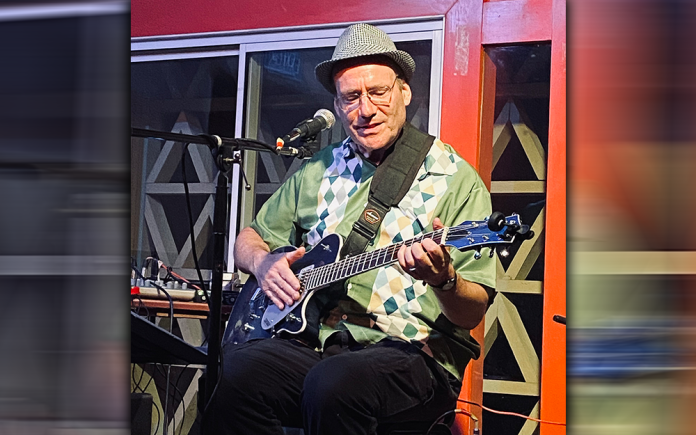
By Teddy Quinn
Based on having seen him perform several times at Open Mic’s, I had described Perry Hoberman as a 21st-century Tom Lehrer. Lehrer, you may recall, was a satirical songwriter, with titles such as “Poisoning Pigeons in the Park,” “Be Prepared,” and “the Vatican Rag,” released on several albums – including the classic, “An Evening Wasted with Tom Lehrer – at the height of the Cold War and McCarthyism. His songs addressed serious social issues with lightheartedness, humor and brilliant wordplay. Then, in 1960, he disappeared from the public eye, retired as a performer and recording artist, and became a part-time Math professor.
After spending an evening, decidedly not wasted, with Hoberman at the acoustically-divine Harrison House in Joshua Tree, I realized that there is far more to this modern bard’s songwriting. I heard echoes of widely-acknowledged greats, such as the late Leonard Cohen and John Prine, and even hints of a very young Bob Dylan in his Greenwich Village days of impersonating and surpassing his own major influence, Woody Guthrie.
A multimedia artist, who has been a longtime collaborator with Laurie Anderson – he played on her groundbreaking single, “O Superman” – and the recipient of numerous awards, including a Guggenheim Fellowship, Hoberman is also a visual artist. He created illustrations for his recently-deceased mother, the former Children’s Poet Laureate Mary Ann Hoberman (The Llama Has No Pajamas) in her final published work, Away with Words (2022.)
Not surprising then, that his work also reminded me of another great children’s poet, Shel Silverstein. Best known in my home as the author of “Where the Sidewalk Ends” and “The Giving Tree,” Silverstein is also the composer of “The Cover of Rolling Stone” and “A Boy Named Sue.”
In Time Machine, our protagonist seeks to return to the recent past (“You just wanted to go back one day/Take back those things you said but finds himself going farther and farther, to a world where “there are no time machines.” Hoberman simulates going back in time by speeding up the tempo and changing the key, higher and higher so that the listener can feel the anxiety of his predicament.
Hoberman satirizes everything from pandemic-era Amazon addiction (“Online Shopping”), the Everything Everywhere All At Once/Spiderman multi-verse (The Many Worlds Lament), and Elon Musk’s Mission to Mars (“Let’s Get off this Earth’) to the New-Age notion of Oneness (“Echo in the Void,” where “this is never going to work, I’m Colonel Sanders, you’re Captain Kirk.”) He touches upon heavier topics, such as those folk music staples, lost love (“Talked Too Long, Said Too Much”) and death (“Why Should We Stop Living?” and “When You’re Dead.”)
Somehow, even the latter left me with a fresh appreciation for living. This show took place the evening of the day that the death of Sinead O’Connor was announced. I will admit that I’d been feeling lately that the age of the singer-songwriter may be coming to a close, but I left feeling renewed.
Clearly, a thinking man, he is also a deeply feeling human, and he deals with all of these subjects with the right balance of resignation, skepticism without cynicism, pathos, and that thing called hope.
Equally intriguing and accomplished, Hoberman’s wife, multimedia artist Julia Heyward, captivated the crowd with two songs, with Perry accompanying her on guitar. (A multi-instrumentalist, Perry stuck with his jet black Gretsch Electromatic and a Martin acoustic throughout the evening.)
By way of Heyward’s compelling storytelling, we could see men in trucks with rifle racks, “Shootin’ the River” of life, where Black Lives Matter and, finally, “women fight back,” while “(I Just Wanna Be) A Little Birdie” had her doing a mesmerizing bird-call, leading the audience in a powerul sing-along.
“He nailed so many sentiments I’ve had but not articulated,” poet/philosopher Larry Fike.
Interestingly, the room was filled with what I might call the “old guard” of Joshua Tree. Artist Bobby Furst sat enraptured in the front row, along with author-activist Chris Clarke, musicians Jill Carey Michaels and members of the Yes Go’s, among other notables in attendance. I sat behind the owner of the Harrison House, Eva Soltes, and we checked with each other via eye contact, in pure delight, frequently throughout the performance, as Hoberman and Heyward moved the capacity crowd to laughter and tears.
I don’t consider myself a casual listener and I do not throw around names but Perry Hoberman, a humble, gentle giant, is truly in the same league as all of those I have mentioned, quietly taking his place in Cohen’s Tower of Song.
Perry Hoberman’s mother, Mary Ann, once wrote, “When I grow up, I want to be a grown-up who remembers me…” and it seems that her son has not forgotten this important lesson.
Presenter Eva Soltes gave a brief introduction, reminding the audience that the Harrison House is a straw bale construction, designed for experimental American composer Lou Harrison by his husband and collaborator, Bill Colvig. It was Colvig and Harrison’s final “instrument” that they built and the room itself has beautiful acoustics, reminiscent of a small chapel.
Postscript: Tom Lehrer is 95 years old and has recently turned over his entire catalog to the public domain.
Tickets were priced on a sliding scale from $20-$50.
Ice cold water was served at a table where various of Hoberman’s posters were available for sale.
–
Ted Quinn is a painter, recording artist and writer based in Joshua Tree, CA. His work has appeared on KCET’s Artbound.











































